55 start with L start with L
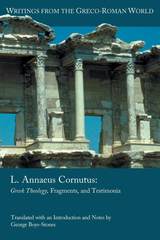
The first English translation of Greek Theology
The first-century CE North African philosopher Cornutus lived in Rome as a philosopher and is best known today for his surviving work Greek Theology, which explores the origins and names of the Greek gods. However, he was also interested in the language and literature of the poets Persius and Lucan and wrote one of the first commentaries on Virgil. This book collects and translates all of our evidence for Cornutus for the first time and includes the first published English translation of Greek Theology. This collection offers entirely fresh insight into the intellectual world of the first century.
Features
- Translation based on the latest critical text
- The first truly holistic picture of Cornutus’s intellectual profile
- A new account of the early debate over Aristotle’s Categories and the Stoic contribution to it
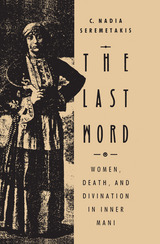
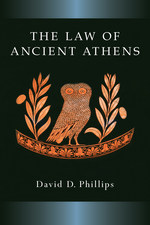
The Law of Ancient Athens contains the principal literary and epigraphical sources, in English, for Athenian law in the Archaic and Classical periods, from the first known historical trial (late seventh century) to the fall of the democracy in 322 BCE.
This accessible and important volume is designed for teachers, students, and general readers interested in the ancient Greek world, the history of law, and the history of democracy, an Athenian invention during this period. Offering a comprehensive treatment of Athenian law, it assumes no prior knowledge of the subject and is organized in user-friendly fashion, progressing from the person to the family to property and obligations to the gods and to the state. David D. Phillips has translated all sources into English, and he has added significant introductory and explanatory material.
Topics covered in the book include homicide and wounding; theft; marriage, children, and inheritance; citizenship; contracts and commerce; impiety; treason and other offenses against the state; and sexual offenses including rape and prostitution. The volume’s unique feature is its presentation of the actual primary sources for Athenian laws, with many key or disputed terms rendered in transliterated Greek. The translated sources, together with the topical introductions, notes, and references, will facilitate both research in the field and the teaching of increasingly popular courses on Athenian law and law in the ancient world.

Scholars at dinner.
In The Learned Banqueters, Athenaeus describes a series of dinner parties at which the guests quote extensively from Greek literature. The work (which dates to the very end of the second century AD) is amusing reading and of extraordinary value as a treasury of quotations from works now lost. Athenaeus also preserves a wide range of information about different cuisines and foodstuffs; the music and entertainments that ornamented banquets; and the intellectual talk that was the heart of Greek conviviality. S. Douglas Olson has undertaken to produce a complete new edition of the work, replacing the previous seven-volume Loeb Athenaeus (published under the title Deipnosophists).

Scholars at dinner.
In The Learned Banqueters, Athenaeus describes a series of dinner parties at which the guests quote extensively from Greek literature. The work (which dates to the very end of the second century AD) is amusing reading and of extraordinary value as a treasury of quotations from works now lost. Athenaeus also preserves a wide range of information about different cuisines and foodstuffs; the music and entertainments that ornamented banquets; and the intellectual talk that was the heart of Greek conviviality. S. Douglas Olson has undertaken to produce a complete new edition of the work, replacing the previous seven-volume Loeb Athenaeus (published under the title Deipnosophists).

Scholars at dinner.
In The Learned Banqueters, Athenaeus describes a series of dinner parties at which the guests quote extensively from Greek literature. The work (which dates to the very end of the second century AD) is amusing reading and of extraordinary value as a treasury of quotations from works now lost. Athenaeus also preserves a wide range of information about different cuisines and foodstuffs; the music and entertainments that ornamented banquets; and the intellectual talk that was the heart of Greek conviviality. S. Douglas Olson has undertaken to produce a complete new edition of the work, replacing the previous seven-volume Loeb Athenaeus (published under the title Deipnosophists).

Scholars at dinner.
In The Learned Banqueters, Athenaeus describes a series of dinner parties at which the guests quote extensively from Greek literature. The work (which dates to the very end of the second century AD) is amusing reading and of extraordinary value as a treasury of quotations from works now lost. Athenaeus also preserves a wide range of information about different cuisines and foodstuffs; the music and entertainments that ornamented banquets; and the intellectual talk that was the heart of Greek conviviality. S. Douglas Olson has undertaken to produce a complete new edition of the work, replacing the previous seven-volume Loeb Athenaeus (published under the title Deipnosophists).

Scholars at dinner.
In The Learned Banqueters, Athenaeus describes a series of dinner parties at which the guests quote extensively from Greek literature. The work (which dates to the very end of the second century AD) is amusing reading and of extraordinary value as a treasury of quotations from works now lost. Athenaeus also preserves a wide range of information about different cuisines and foodstuffs; the music and entertainments that ornamented banquets; and the intellectual talk that was the heart of Greek conviviality. S. Douglas Olson has undertaken to produce a complete new edition of the work, replacing the previous seven-volume Loeb Athenaeus (published under the title Deipnosophists).

Scholars at dinner.
In The Learned Banqueters, Athenaeus describes a series of dinner parties at which the guests quote extensively from Greek literature. The work (which dates to the very end of the second century AD) is amusing reading and of extraordinary value as a treasury of quotations from works now lost. Athenaeus also preserves a wide range of information about different cuisines and foodstuffs; the music and entertainments that ornamented banquets; and the intellectual talk that was the heart of Greek conviviality. S. Douglas Olson has undertaken to produce a complete new edition of the work, replacing the previous seven-volume Loeb Athenaeus (published under the title Deipnosophists).
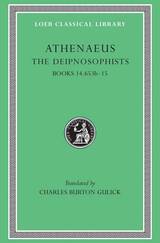
Scholars at dinner.
In The Learned Banqueters, Athenaeus describes a series of dinner parties at which the guests quote extensively from Greek literature. The work (which dates to the very end of the second century AD) is amusing reading and of extraordinary value as a treasury of quotations from works now lost. Athenaeus also preserves a wide range of information about different cuisines and foodstuffs; the music and entertainments that ornamented banquets; and the intellectual talk that was the heart of Greek conviviality. S. Douglas Olson has undertaken to produce a complete new edition of the work, replacing the previous seven-volume Loeb Athenaeus (published under the title Deipnosophists).
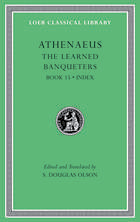
Scholars at dinner.
In The Learned Banqueters, Athenaeus describes a series of dinner parties at which the guests quote extensively from Greek literature. The work (which dates to the very end of the second century AD) is amusing reading and of extraordinary value as a treasury of quotations from works now lost. Athenaeus also preserves a wide range of information about different cuisines and foodstuffs; the music and entertainments that ornamented banquets; and the intellectual talk that was the heart of Greek conviviality. S. Douglas Olson has undertaken to produce a complete new edition of the work, replacing the previous seven-volume Loeb Athenaeus (published under the title Deipnosophists).
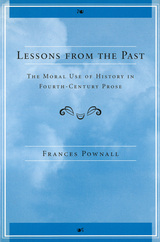
Frances Pownall is Professor of History and Classics, University of Alberta.

Correspondence of a Cappadocian Father.
Basil the Great was born ca. AD 330 at Caesarea in Cappadocia into a family noted for piety. He was at Constantinople and Athens for several years as a student with Gregory of Nazianzus and was much influenced by Origen. For a short time he held a chair of rhetoric at Caesarea, and was then baptized. He visited monasteries in Egypt and Palestine and sought out the most famous hermits in Syria and elsewhere to learn how to lead a pious and ascetic life; but he decided that communal monastic life and work were best. About 360 he founded in Pontus a convent to which his sister and widowed mother belonged. Ordained a presbyter in 365, in 370 he succeeded Eusebius in the archbishopric of Caesarea, which included authority over all Pontus. He died in 379. Even today his reform of monastic life in the east is the basis of modern Greek and Slavonic monasteries.
The Loeb Classical Library edition of Basil’s Letters is in four volumes.

Correspondence of a Cappadocian Father.
Basil the Great was born ca. AD 330 at Caesarea in Cappadocia into a family noted for piety. He was at Constantinople and Athens for several years as a student with Gregory of Nazianzus and was much influenced by Origen. For a short time he held a chair of rhetoric at Caesarea, and was then baptized. He visited monasteries in Egypt and Palestine and sought out the most famous hermits in Syria and elsewhere to learn how to lead a pious and ascetic life; but he decided that communal monastic life and work were best. About 360 he founded in Pontus a convent to which his sister and widowed mother belonged. Ordained a presbyter in 365, in 370 he succeeded Eusebius in the archbishopric of Caesarea, which included authority over all Pontus. He died in 379. Even today his reform of monastic life in the east is the basis of modern Greek and Slavonic monasteries.
The Loeb Classical Library edition of Basil’s Letters is in four volumes.

Correspondence of a Cappadocian Father.
Basil the Great was born ca. AD 330 at Caesarea in Cappadocia into a family noted for piety. He was at Constantinople and Athens for several years as a student with Gregory of Nazianzus and was much influenced by Origen. For a short time he held a chair of rhetoric at Caesarea, and was then baptized. He visited monasteries in Egypt and Palestine and sought out the most famous hermits in Syria and elsewhere to learn how to lead a pious and ascetic life; but he decided that communal monastic life and work were best. About 360 he founded in Pontus a convent to which his sister and widowed mother belonged. Ordained a presbyter in 365, in 370 he succeeded Eusebius in the archbishopric of Caesarea, which included authority over all Pontus. He died in 379. Even today his reform of monastic life in the east is the basis of modern Greek and Slavonic monasteries.
The Loeb Classical Library edition of Basil’s Letters is in four volumes.

Correspondence of a Cappadocian Father.
Basil the Great was born ca. AD 330 at Caesarea in Cappadocia into a family noted for piety. He was at Constantinople and Athens for several years as a student with Gregory of Nazianzus and was much influenced by Origen. For a short time he held a chair of rhetoric at Caesarea, and was then baptized. He visited monasteries in Egypt and Palestine and sought out the most famous hermits in Syria and elsewhere to learn how to lead a pious and ascetic life; but he decided that communal monastic life and work were best. About 360 he founded in Pontus a convent to which his sister and widowed mother belonged. Ordained a presbyter in 365, in 370 he succeeded Eusebius in the archbishopric of Caesarea, which included authority over all Pontus. He died in 379. Even today his reform of monastic life in the east is the basis of modern Greek and Slavonic monasteries.
The Loeb Classical Library edition of Basil’s Letters is in four volumes.

Remains of a universal chronicle.
Diodorus Siculus, Greek historian of Agyrium in Sicily (ca. 80–20 BC), wrote forty books of world history, called Library of History, in three parts: mythical history of peoples, non-Greek and Greek, to the Trojan War; history to Alexander's death (323 BC); history to 54 BC. Of this we have complete Books 1–5 (Egyptians, Assyrians, Ethiopians, Greeks) and Books 11–20 (Greek history 480–302 BC); and fragments of the rest. He was an uncritical compiler, but used good sources and reproduced them faithfully. He is valuable for details unrecorded elsewhere, and as evidence for works now lost, especially writings of Ephorus, Apollodorus, Agatharchides, Philistus, and Timaeus.
The Loeb Classical Library edition of Diodorus Siculus is in twelve volumes.

Remains of a universal chronicle.
Diodorus Siculus, Greek historian of Agyrium in Sicily (ca. 80–20 BC), wrote forty books of world history, called Library of History, in three parts: mythical history of peoples, non-Greek and Greek, to the Trojan War; history to Alexander's death (323 BC); history to 54 BC. Of this we have complete Books 1–5 (Egyptians, Assyrians, Ethiopians, Greeks) and Books 11–20 (Greek history 480–302 BC); and fragments of the rest. He was an uncritical compiler, but used good sources and reproduced them faithfully. He is valuable for details unrecorded elsewhere, and as evidence for works now lost, especially writings of Ephorus, Apollodorus, Agatharchides, Philistus, and Timaeus.
The Loeb Classical Library edition of Diodorus Siculus is in twelve volumes.

Remains of a universal chronicle.
Diodorus Siculus, Greek historian of Agyrium in Sicily (ca. 80–20 BC), wrote forty books of world history, called Library of History, in three parts: mythical history of peoples, non-Greek and Greek, to the Trojan War; history to Alexander's death (323 BC); history to 54 BC. Of this we have complete Books 1–5 (Egyptians, Assyrians, Ethiopians, Greeks) and Books 11–20 (Greek history 480–302 BC); and fragments of the rest. He was an uncritical compiler, but used good sources and reproduced them faithfully. He is valuable for details unrecorded elsewhere, and as evidence for works now lost, especially writings of Ephorus, Apollodorus, Agatharchides, Philistus, and Timaeus.
The Loeb Classical Library edition of Diodorus Siculus is in twelve volumes.

Remains of a universal chronicle.
Diodorus Siculus, Greek historian of Agyrium in Sicily (ca. 80–20 BC), wrote forty books of world history, called Library of History, in three parts: mythical history of peoples, non-Greek and Greek, to the Trojan War; history to Alexander's death (323 BC); history to 54 BC. Of this we have complete Books 1–5 (Egyptians, Assyrians, Ethiopians, Greeks) and Books 11–20 (Greek history 480–302 BC); and fragments of the rest. He was an uncritical compiler, but used good sources and reproduced them faithfully. He is valuable for details unrecorded elsewhere, and as evidence for works now lost, especially writings of Ephorus, Apollodorus, Agatharchides, Philistus, and Timaeus.
The Loeb Classical Library edition of Diodorus Siculus is in twelve volumes.
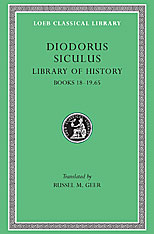
Remains of a universal chronicle.
Diodorus Siculus, Greek historian of Agyrium in Sicily (ca. 80–20 BC), wrote forty books of world history, called Library of History, in three parts: mythical history of peoples, non-Greek and Greek, to the Trojan War; history to Alexander's death (323 BC); history to 54 BC. Of this we have complete Books 1–5 (Egyptians, Assyrians, Ethiopians, Greeks) and Books 11–20 (Greek history 480–302 BC); and fragments of the rest. He was an uncritical compiler, but used good sources and reproduced them faithfully. He is valuable for details unrecorded elsewhere, and as evidence for works now lost, especially writings of Ephorus, Apollodorus, Agatharchides, Philistus, and Timaeus.
The Loeb Classical Library edition of Diodorus Siculus is in twelve volumes.

Remains of a universal chronicle.
Diodorus Siculus, Greek historian of Agyrium in Sicily (ca. 80–20 BC), wrote forty books of world history, called Library of History, in three parts: mythical history of peoples, non-Greek and Greek, to the Trojan War; history to Alexander's death (323 BC); history to 54 BC. Of this we have complete Books 1–5 (Egyptians, Assyrians, Ethiopians, Greeks) and Books 11–20 (Greek history 480–302 BC); and fragments of the rest. He was an uncritical compiler, but used good sources and reproduced them faithfully. He is valuable for details unrecorded elsewhere, and as evidence for works now lost, especially writings of Ephorus, Apollodorus, Agatharchides, Philistus, and Timaeus.
The Loeb Classical Library edition of Diodorus Siculus is in twelve volumes.

Remains of a universal chronicle.
Diodorus Siculus, Greek historian of Agyrium in Sicily (ca. 80–20 BC), wrote forty books of world history, called Library of History, in three parts: mythical history of peoples, non-Greek and Greek, to the Trojan War; history to Alexander's death (323 BC); history to 54 BC. Of this we have complete Books 1–5 (Egyptians, Assyrians, Ethiopians, Greeks) and Books 11–20 (Greek history 480–302 BC); and fragments of the rest. He was an uncritical compiler, but used good sources and reproduced them faithfully. He is valuable for details unrecorded elsewhere, and as evidence for works now lost, especially writings of Ephorus, Apollodorus, Agatharchides, Philistus, and Timaeus.
The Loeb Classical Library edition of Diodorus Siculus is in twelve volumes.

Remains of a universal chronicle.
Diodorus Siculus, Greek historian of Agyrium in Sicily (ca. 80–20 BC), wrote forty books of world history, called Library of History, in three parts: mythical history of peoples, non-Greek and Greek, to the Trojan War; history to Alexander's death (323 BC); history to 54 BC. Of this we have complete Books 1–5 (Egyptians, Assyrians, Ethiopians, Greeks) and Books 11–20 (Greek history 480–302 BC); and fragments of the rest. He was an uncritical compiler, but used good sources and reproduced them faithfully. He is valuable for details unrecorded elsewhere, and as evidence for works now lost, especially writings of Ephorus, Apollodorus, Agatharchides, Philistus, and Timaeus.
The Loeb Classical Library edition of Diodorus Siculus is in twelve volumes.

Remains of a universal chronicle.
Diodorus Siculus, Greek historian of Agyrium in Sicily (ca. 80–20 BC), wrote forty books of world history, called Library of History, in three parts: mythical history of peoples, non-Greek and Greek, to the Trojan War; history to Alexander's death (323 BC); history to 54 BC. Of this we have complete Books 1–5 (Egyptians, Assyrians, Ethiopians, Greeks) and Books 11–20 (Greek history 480–302 BC); and fragments of the rest. He was an uncritical compiler, but used good sources and reproduced them faithfully. He is valuable for details unrecorded elsewhere, and as evidence for works now lost, especially writings of Ephorus, Apollodorus, Agatharchides, Philistus, and Timaeus.
The Loeb Classical Library edition of Diodorus Siculus is in twelve volumes.

Remains of a universal chronicle.
Diodorus Siculus, Greek historian of Agyrium in Sicily (ca. 80–20 BC), wrote forty books of world history, called Library of History, in three parts: mythical history of peoples, non-Greek and Greek, to the Trojan War; history to Alexander's death (323 BC); history to 54 BC. Of this we have complete Books 1–5 (Egyptians, Assyrians, Ethiopians, Greeks) and Books 11–20 (Greek history 480–302 BC); and fragments of the rest. He was an uncritical compiler, but used good sources and reproduced them faithfully. He is valuable for details unrecorded elsewhere, and as evidence for works now lost, especially writings of Ephorus, Apollodorus, Agatharchides, Philistus, and Timaeus.
The Loeb Classical Library edition of Diodorus Siculus is in twelve volumes.

Remains of a universal chronicle.
Diodorus Siculus, Greek historian of Agyrium in Sicily (ca. 80–20 BC), wrote forty books of world history, called Library of History, in three parts: mythical history of peoples, non-Greek and Greek, to the Trojan War; history to Alexander's death (323 BC); history to 54 BC. Of this we have complete Books 1–5 (Egyptians, Assyrians, Ethiopians, Greeks) and Books 11–20 (Greek history 480–302 BC); and fragments of the rest. He was an uncritical compiler, but used good sources and reproduced them faithfully. He is valuable for details unrecorded elsewhere, and as evidence for works now lost, especially writings of Ephorus, Apollodorus, Agatharchides, Philistus, and Timaeus.
The Loeb Classical Library edition of Diodorus Siculus is in twelve volumes.

Remains of a universal chronicle.
Diodorus Siculus, Greek historian of Agyrium in Sicily (ca. 80–20 BC), wrote forty books of world history, called Library of History, in three parts: mythical history of peoples, non-Greek and Greek, to the Trojan War; history to Alexander's death (323 BC); history to 54 BC. Of this we have complete Books 1–5 (Egyptians, Assyrians, Ethiopians, Greeks) and Books 11–20 (Greek history 480–302 BC); and fragments of the rest. He was an uncritical compiler, but used good sources and reproduced them faithfully. He is valuable for details unrecorded elsewhere, and as evidence for works now lost, especially writings of Ephorus, Apollodorus, Agatharchides, Philistus, and Timaeus.
The Loeb Classical Library edition of Diodorus Siculus is in twelve volumes.

Antiquity’s most influential mythological handbook.
The Library provides in three books a grand summary of traditional Greek mythology and heroic legends. Written in clear and unaffected style, the compendium faithfully follows the Greek literary sources. It is thus an important record of Greek accounts of the origin and early history of the world and their race. This work has been attributed to Apollodorus of Athens (born ca. 180 BC), a student of Aristarchus. But the text as we have it was written by an author probably living in the first or second century of our era.
In his highly valued notes to the Loeb Classical Library edition (which is in two volumes) J. G. Frazer cites the principal passages of other ancient writers where each particular story is told and compares the various versions to those in the Library.

Antiquity’s most influential mythological handbook.
The Library provides in three books a grand summary of traditional Greek mythology and heroic legends. Written in clear and unaffected style, the compendium faithfully follows the Greek literary sources. It is thus an important record of Greek accounts of the origin and early history of the world and their race. This work has been attributed to Apollodorus of Athens (born ca. 180 BC), a student of Aristarchus. But the text as we have it was written by an author probably living in the first or second century of our era.
In his highly valued notes to the Loeb Classical Library edition (which is in two volumes) J. G. Frazer cites the principal passages of other ancient writers where each particular story is told and compares the various versions to those in the Library.
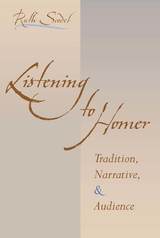
For a particular audience at a particular moment, "tradition" is what it believes it has inherited from the past--and it may not be particularly old. The boundaries between the traditional and the innovative may become blurry and indistinct. By rethinking tradition, we can see Homer's methods and concerns in a new light. The Homeric poet is not naive. He must convince his audience that the story is true. He must therefore seem disinterested, unconcerned with promoting anyone's interests. The poet speaks as if everything he says is merely the repetition of old tales. Yet he carefully ensures that even someone who knows only a minimal amount about the ancient heroes can follow and enjoy the performance, while someone who knows many stories will not remember inappropriate ones. Pretending that every detail is already familiar, the poet heightens suspense and implies that ordinary people are the real judges of great heroes.
---Greece & Rome
---Irene J.F. de Jong, Gnomon

Inscribed some time after 264 BCE, the Parian Marble offers a chronological list of events with an exceptional emphasis on literary matters. Literary History in the Parian Marble explores the literary and historiographical qualities of the inscription, the genre to which it belongs, and the emerging patterns of time. Endorsing the hypothesis that the inscription was originally displayed at a Parian shrine honoring Archilochus, Andrea Rotstein argues that literary history was one of its main concerns. Though it may be conventional in its focus on the chronology of poets, their inventions and victories, the Parian Marble is nonetheless idiosyncratic in the range of authors displayed. By reconstructing the methods by which information might have been obtained, Rotstein contributes to an understanding of the way literary history was practiced within the local communities of ancient Greece, away from the major Hellenistic centers of scholarship.
The Parian chronicle has not been the subject of a comprehensive study for almost a century. Literary History in the Parian Marble brings to the English-speaking audience up-to-date information about the inscription, including a revision of Felix Jacoby’s Greek text and a complete translation.

Examined lives.
Diogenes Laertius, author of a work on Greek philosophy, lived probably in the earlier half of the third century, his ancestry and birthplace being unknown. He was an Epicurean philosopher, but his work is not philosophical. The title is History of Philosophy or On the Lives, Opinions, and Sayings of Famous Philosophers; the work, in ten books, is divided unscientifically into two “Successions” or sections: “Ionian” from Anaximander to Theophrastus and Chrysippus, including the Socratic schools; “Italian” from Pythagoras to Epicurus (who fills all the last book), including the Eleatics and Sceptics. It is a collection of quotations and facts, and is of very great value.
The Loeb Classical Library edition of Diogenes Laertius is in two volumes.

Examined lives.
Diogenes Laertius, author of a work on Greek philosophy, lived probably in the earlier half of the third century, his ancestry and birthplace being unknown. He was an Epicurean philosopher, but his work is not philosophical. The title is History of Philosophy or On the Lives, Opinions, and Sayings of Famous Philosophers; the work, in ten books, is divided unscientifically into two “Successions” or sections: “Ionian” from Anaximander to Theophrastus and Chrysippus, including the Socratic schools; “Italian” from Pythagoras to Epicurus (who fills all the last book), including the Eleatics and Sceptics. It is a collection of quotations and facts, and is of very great value.
The Loeb Classical Library edition of Diogenes Laertius is in two volumes.

Two sophists on the history of sophistry.
Flavius Philostratus, known as “the Elder” or “the Athenian,” was born to a distinguished family with close ties to Lesbos in the later second century, and died around the middle of the third. A sophist who studied at Athens and later lived in Rome, Philostratus provides in Lives of the Sophists a treasury of information about notable practitioners. His sketches of sophists in action paint a fascinating picture of their predominant influence in the educational, social, and political life of the Empire in his time. He is almost certainly the author also of the Life of Apollonius of Tyana (LCL 16, 17, 458) and Heroicus and Gymnasticus (LCL 521).
Eunapius (ca. 345–415) was born in Sardis but studied and spent much of his life in Athens as a sophist and historian. His Lives of Philosophers and Sophists covers figures of personal or intellectual significance to him in the period from Plotinus (ca. 250) to Chrystanthus (ca. 380), including one remarkable woman, Sosipatra, and then focuses on Iamblichus and his students. The work’s underlying rationale combines personal devotion to teachers and colleagues with a broader attempt to rehabilitate Hellenic cultural icons against the rise of Christianity and the influence of its representatives.
This edition of Philostratus and Eunapius thoroughly revises the original edition by Wilmer C. Wright (1921) in light of modern scholarship.

Comparative biographies of distinguished Greeks and Romans.
Plutarch (Plutarchus), ca. AD 45–120, was born at Chaeronea in Boeotia in central Greece, studied philosophy at Athens, and, after coming to Rome as a teacher in philosophy, was given consular rank by the emperor Trajan and a procuratorship in Greece by Hadrian. He was married and the father of one daughter and four sons. He appears as a man of kindly character and independent thought, studious and learned.
Plutarch wrote on many subjects. Most popular have always been the forty-six Parallel Lives, biographies planned to be ethical examples in pairs (in each pair, one Greek figure and one similar Roman), though the last four lives are single. All are invaluable sources of our knowledge of the lives and characters of Greek and Roman statesmen, soldiers, and orators. Plutarch's many other varied extant works, about sixty in number, are known as Moralia or Moral Essays. They are of high literary value, besides being of great use to people interested in philosophy, ethics, and religion.
The Loeb Classical Library edition of the Lives is in eleven volumes.

Comparative biographies of distinguished Greeks and Romans.
Plutarch (Plutarchus), ca. AD 45–120, was born at Chaeronea in Boeotia in central Greece, studied philosophy at Athens, and, after coming to Rome as a teacher in philosophy, was given consular rank by the emperor Trajan and a procuratorship in Greece by Hadrian. He was married and the father of one daughter and four sons. He appears as a man of kindly character and independent thought, studious and learned.
Plutarch wrote on many subjects. Most popular have always been the forty-six Parallel Lives, biographies planned to be ethical examples in pairs (in each pair, one Greek figure and one similar Roman), though the last four lives are single. All are invaluable sources of our knowledge of the lives and characters of Greek and Roman statesmen, soldiers, and orators. Plutarch's many other varied extant works, about sixty in number, are known as Moralia or Moral Essays. They are of high literary value, besides being of great use to people interested in philosophy, ethics, and religion.
The Loeb Classical Library edition of the Lives is in eleven volumes.

Comparative biographies of distinguished Greeks and Romans.
Plutarch (Plutarchus), ca. AD 45–120, was born at Chaeronea in Boeotia in central Greece, studied philosophy at Athens, and, after coming to Rome as a teacher in philosophy, was given consular rank by the emperor Trajan and a procuratorship in Greece by Hadrian. He was married and the father of one daughter and four sons. He appears as a man of kindly character and independent thought, studious and learned.
Plutarch wrote on many subjects. Most popular have always been the forty-six Parallel Lives, biographies planned to be ethical examples in pairs (in each pair, one Greek figure and one similar Roman), though the last four lives are single. All are invaluable sources of our knowledge of the lives and characters of Greek and Roman statesmen, soldiers, and orators. Plutarch's many other varied extant works, about sixty in number, are known as Moralia or Moral Essays. They are of high literary value, besides being of great use to people interested in philosophy, ethics, and religion.
The Loeb Classical Library edition of the Lives is in eleven volumes.

Comparative biographies of distinguished Greeks and Romans.
Plutarch (Plutarchus), ca. AD 45–120, was born at Chaeronea in Boeotia in central Greece, studied philosophy at Athens, and, after coming to Rome as a teacher in philosophy, was given consular rank by the emperor Trajan and a procuratorship in Greece by Hadrian. He was married and the father of one daughter and four sons. He appears as a man of kindly character and independent thought, studious and learned.
Plutarch wrote on many subjects. Most popular have always been the forty-six Parallel Lives, biographies planned to be ethical examples in pairs (in each pair, one Greek figure and one similar Roman), though the last four lives are single. All are invaluable sources of our knowledge of the lives and characters of Greek and Roman statesmen, soldiers, and orators. Plutarch's many other varied extant works, about sixty in number, are known as Moralia or Moral Essays. They are of high literary value, besides being of great use to people interested in philosophy, ethics, and religion.
The Loeb Classical Library edition of the Lives is in eleven volumes.

Comparative biographies of distinguished Greeks and Romans.
Plutarch (Plutarchus), ca. AD 45–120, was born at Chaeronea in Boeotia in central Greece, studied philosophy at Athens, and, after coming to Rome as a teacher in philosophy, was given consular rank by the emperor Trajan and a procuratorship in Greece by Hadrian. He was married and the father of one daughter and four sons. He appears as a man of kindly character and independent thought, studious and learned.
Plutarch wrote on many subjects. Most popular have always been the forty-six Parallel Lives, biographies planned to be ethical examples in pairs (in each pair, one Greek figure and one similar Roman), though the last four lives are single. All are invaluable sources of our knowledge of the lives and characters of Greek and Roman statesmen, soldiers, and orators. Plutarch's many other varied extant works, about sixty in number, are known as Moralia or Moral Essays. They are of high literary value, besides being of great use to people interested in philosophy, ethics, and religion.
The Loeb Classical Library edition of the Lives is in eleven volumes.

Comparative biographies of distinguished Greeks and Romans.
Plutarch (Plutarchus), ca. AD 45–120, was born at Chaeronea in Boeotia in central Greece, studied philosophy at Athens, and, after coming to Rome as a teacher in philosophy, was given consular rank by the emperor Trajan and a procuratorship in Greece by Hadrian. He was married and the father of one daughter and four sons. He appears as a man of kindly character and independent thought, studious and learned.
Plutarch wrote on many subjects. Most popular have always been the forty-six Parallel Lives, biographies planned to be ethical examples in pairs (in each pair, one Greek figure and one similar Roman), though the last four lives are single. All are invaluable sources of our knowledge of the lives and characters of Greek and Roman statesmen, soldiers, and orators. Plutarch's many other varied extant works, about sixty in number, are known as Moralia or Moral Essays. They are of high literary value, besides being of great use to people interested in philosophy, ethics, and religion.
The Loeb Classical Library edition of the Lives is in eleven volumes.

Comparative biographies of distinguished Greeks and Romans.
Plutarch (Plutarchus), ca. AD 45–120, was born at Chaeronea in Boeotia in central Greece, studied philosophy at Athens, and, after coming to Rome as a teacher in philosophy, was given consular rank by the emperor Trajan and a procuratorship in Greece by Hadrian. He was married and the father of one daughter and four sons. He appears as a man of kindly character and independent thought, studious and learned.
Plutarch wrote on many subjects. Most popular have always been the forty-six Parallel Lives, biographies planned to be ethical examples in pairs (in each pair, one Greek figure and one similar Roman), though the last four lives are single. All are invaluable sources of our knowledge of the lives and characters of Greek and Roman statesmen, soldiers, and orators. Plutarch's many other varied extant works, about sixty in number, are known as Moralia or Moral Essays. They are of high literary value, besides being of great use to people interested in philosophy, ethics, and religion.
The Loeb Classical Library edition of the Lives is in eleven volumes.

Comparative biographies of distinguished Greeks and Romans.
Plutarch (Plutarchus), ca. AD 45–120, was born at Chaeronea in Boeotia in central Greece, studied philosophy at Athens, and, after coming to Rome as a teacher in philosophy, was given consular rank by the emperor Trajan and a procuratorship in Greece by Hadrian. He was married and the father of one daughter and four sons. He appears as a man of kindly character and independent thought, studious and learned.
Plutarch wrote on many subjects. Most popular have always been the forty-six Parallel Lives, biographies planned to be ethical examples in pairs (in each pair, one Greek figure and one similar Roman), though the last four lives are single. All are invaluable sources of our knowledge of the lives and characters of Greek and Roman statesmen, soldiers, and orators. Plutarch's many other varied extant works, about sixty in number, are known as Moralia or Moral Essays. They are of high literary value, besides being of great use to people interested in philosophy, ethics, and religion.
The Loeb Classical Library edition of the Lives is in eleven volumes.

Comparative biographies of distinguished Greeks and Romans.
Plutarch (Plutarchus), ca. AD 45–120, was born at Chaeronea in Boeotia in central Greece, studied philosophy at Athens, and, after coming to Rome as a teacher in philosophy, was given consular rank by the emperor Trajan and a procuratorship in Greece by Hadrian. He was married and the father of one daughter and four sons. He appears as a man of kindly character and independent thought, studious and learned.
Plutarch wrote on many subjects. Most popular have always been the forty-six Parallel Lives, biographies planned to be ethical examples in pairs (in each pair, one Greek figure and one similar Roman), though the last four lives are single. All are invaluable sources of our knowledge of the lives and characters of Greek and Roman statesmen, soldiers, and orators. Plutarch's many other varied extant works, about sixty in number, are known as Moralia or Moral Essays. They are of high literary value, besides being of great use to people interested in philosophy, ethics, and religion.
The Loeb Classical Library edition of the Lives is in eleven volumes.

Comparative biographies of distinguished Greeks and Romans.
Plutarch (Plutarchus), ca. AD 45–120, was born at Chaeronea in Boeotia in central Greece, studied philosophy at Athens, and, after coming to Rome as a teacher in philosophy, was given consular rank by the emperor Trajan and a procuratorship in Greece by Hadrian. He was married and the father of one daughter and four sons. He appears as a man of kindly character and independent thought, studious and learned.
Plutarch wrote on many subjects. Most popular have always been the forty-six Parallel Lives, biographies planned to be ethical examples in pairs (in each pair, one Greek figure and one similar Roman), though the last four lives are single. All are invaluable sources of our knowledge of the lives and characters of Greek and Roman statesmen, soldiers, and orators. Plutarch's many other varied extant works, about sixty in number, are known as Moralia or Moral Essays. They are of high literary value, besides being of great use to people interested in philosophy, ethics, and religion.
The Loeb Classical Library edition of the Lives is in eleven volumes.

Comparative biographies of distinguished Greeks and Romans.
Plutarch (Plutarchus), ca. AD 45–120, was born at Chaeronea in Boeotia in central Greece, studied philosophy at Athens, and, after coming to Rome as a teacher in philosophy, was given consular rank by the emperor Trajan and a procuratorship in Greece by Hadrian. He was married and the father of one daughter and four sons. He appears as a man of kindly character and independent thought, studious and learned.
Plutarch wrote on many subjects. Most popular have always been the forty-six Parallel Lives, biographies planned to be ethical examples in pairs (in each pair, one Greek figure and one similar Roman), though the last four lives are single. All are invaluable sources of our knowledge of the lives and characters of Greek and Roman statesmen, soldiers, and orators. Plutarch's many other varied extant works, about sixty in number, are known as Moralia or Moral Essays. They are of high literary value, besides being of great use to people interested in philosophy, ethics, and religion.
The Loeb Classical Library edition of the Lives is in eleven volumes.
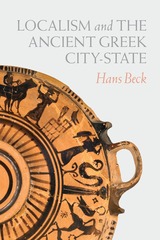
Drawing on a staggering range of materials—including texts by both known and obscure writers, numismatics, pottery analysis, and archeological records—Beck develops fine-grained case studies that illustrate the significance of the local experience. Localism and the Ancient Greek City-State builds bridges across disciplines and ideas within the humanities and shows how looking back at the history of Greek localism is important not only in the archaeology of the ancient Mediterranean, but also in today’s conversations about globalism, networks, and migration.
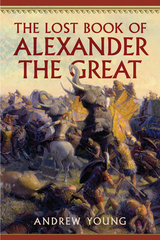
Alexander the Great is well known as one of the first great empire builders of the ancient world. Among those fellow Macedonian officers who accompanied Alexander in his epic conquests from Greece to India was Ptolemy Lagides. Ptolemy served alongside Alexander from the Persian defeat at the Battle of Issus in modern-day Turkey and the journey to find the oracle that proclaimed Alexander to be Zeus incarnate, to the Battle of the Hydaspes River in 326 BC that opened India to the West. Following Alexander’s death, Ptolemy gained control of Egypt where he founded the dynasty in his name, created the great library of Alexandria, and was patron of the mathematician Euclid. Sometime during his rule in Egypt, Ptolemy wrote a history of Alexander’s conquests. Although it is probable that Ptolemy enhanced his own importance, sources indicate that it was regarded as an accurate and even-handed account of the campaigns of Alexander. However, Ptolemy’s book was lost—perhaps with the destruction of the library he founded—and not even an original fragment has survived. His book, however, was acknowledged as a primary source of information for later Roman historians.
In The Lost Book of Alexander the Great, Andrew Young explores the world of ancient writings about the Macedonian leader in order to determine whether any of Ptolemy’s writings can be recovered. Inspired by Stephen Greenblatt’s distinguished biography of Shakespeare, Will in the World, and written for the general reader, the author uses literary forensics to suggest which parts of later books about Alexander the Great, most notably the account by Arrian of Nicomedia, might be the words of Ptolemy. In addition to separating later Roman sensibilities from the original Greek of Ptolemy, the author re-creates the famous library of Alexandria, and takes the reader along on Alexander’s conquests as closely as we can to how Ptolemy may have recounted them.

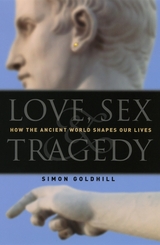
Marx, Clark Gable, George W. Bush, Oscar Wilde, and Freud—Goldhill's range here is enormous, and he takes great delight in tracing both follies and fundamental philosophical questions through the centuries and continents to the birthplace of Western civilization as we know it. Underlying his brisk and learned excursions through history and art is the foundational belief, following Cicero, that learning about the classics makes a critical difference to our self-understanding. Whether we are considering the role of religion in contemporary society, our expectations about the boundaries between public and private life, or even how we spend our free time, recognizing the role of the classics is integral to our comprehension of modern life and our place in it.
When Goldhill asks "Who do you think you are?" he presents us with the rarest of opportunities: the chance to let him lead us, firmly but with a wink, back two thousand years to where we are.

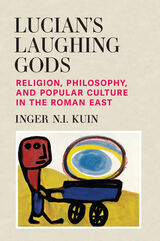
In Lucian's Laughing Gods, author Inger N. I. Kuin argues that in ancient Greek thought, comedic depictions of divinities were not necessarily desacralizing. In religion, laughter was accommodated to such an extent as to actually be constituent of some ritual practices, and the gods were imagined either to reciprocate or push back against human laughter—they were never deflated by it. Lucian uses the gods as comic characters, but in doing so, he does not automatically negate their power. Instead, with his depiction of the gods and of how they relate to humans—frivolous, insecure, callous—Lucian challenges the dominant theologies of his day as he refuses to interpret the gods as ethical models. This book contextualizes Lucian’s comedic performances in the intellectual life of the second century CE Roman East broadly, including philosophy, early Christian thought, and popular culture (dance, fables, standard jokes, etc.). His texts are analyzed as providing a window onto non-elite attitudes and experiences, and methodologies from religious studies and the sociology of religion are used to conceptualize Lucian’s engagement with the religiosity of his contemporaries.
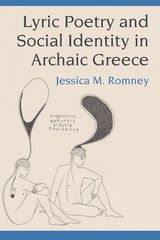
All non-English text and quotes are translated, with the original languages given alongside the translation or in the endnotes.

Attic eloquence.
Lysias (ca. 458–ca. 380 BC), born at Athens, son of a wealthy Syracusan settled in Attica, lived in Piraeus, where with his brother he inherited his father’s shield factory. Being a loyal supporter of democracy, Lysias took the side of the democrats at Athens against the Thirty Tyrants in 404, supplying shields and money. After one political speech in accusation of Eratosthenes (one of the Thirty) in 405, he became at Athens a busy professional speech writer for the law courts. At the Olympic festival of 388 he denounced, with riotous results, the costly display of the embassy sent by Dionysius I of Syracuse and the domination of Sicily by Dionysius.
The surviving speeches of Lysias (about thirty complete out of a very much larger number) are fluent, simple, and graceful in style yet vivid in description. They suggest a passionate partisan who was also a gentle, humorous man. We see in him the art of oratory young and fresh.
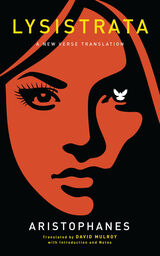
A perennial classroom and stage favorite as well as the basis of Spike Lee’s Chi-Raq, the play is as relevant today as it was 2,500 years ago. The premise is simplicity itself: to end the Peloponnesian War, women decide to withhold sex from their husbands until the fighting stops.
The play is by turns raucous, bawdy, frantic, and funny. David Mulroy’s exciting new translation retains the original’s verse format, racy jokes, and vibrancy—setting it apart from previous efforts, which are typically reproduced as prose or depart from meaning and meter. His introduction offers a concise summary of Aristophanes’ life and social milieu, including a brief overview of the Peloponnesian War, which took place during the playwright’s lifetime. The appendices include guides on translating meter and Greek pronunciation for aspiring thespians.
READERS
Browse our collection.
PUBLISHERS
See BiblioVault's publisher services.
STUDENT SERVICES
Files for college accessibility offices.
UChicago Accessibility Resources
home | accessibility | search | about | contact us
BiblioVault ® 2001 - 2024
The University of Chicago Press









